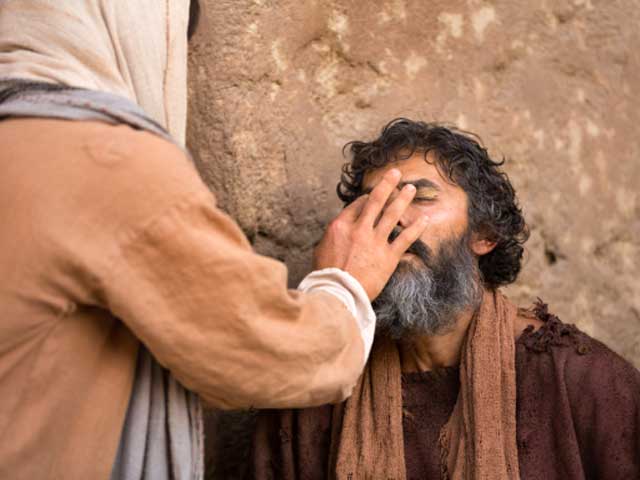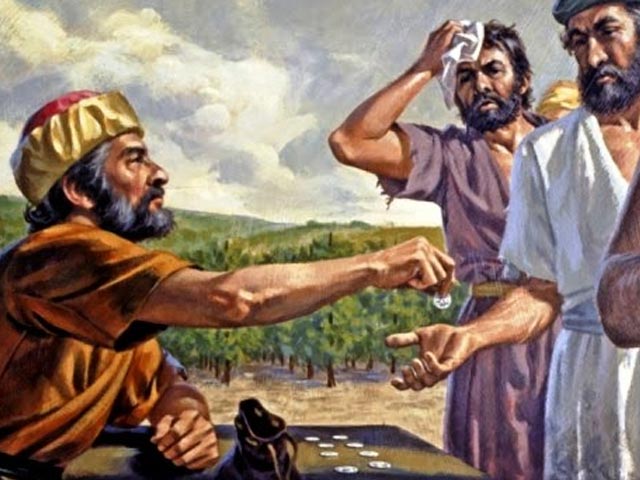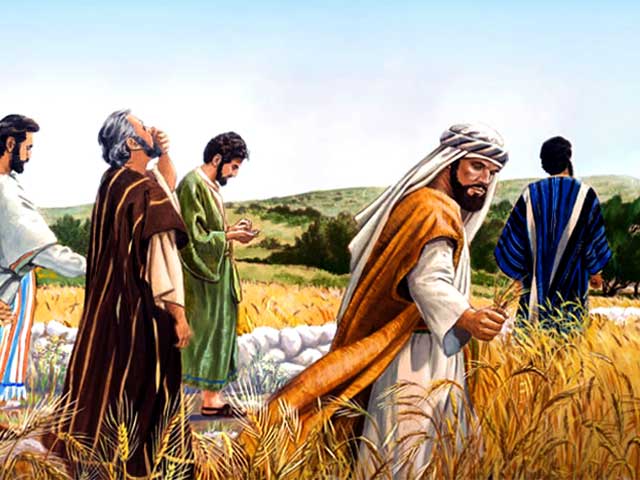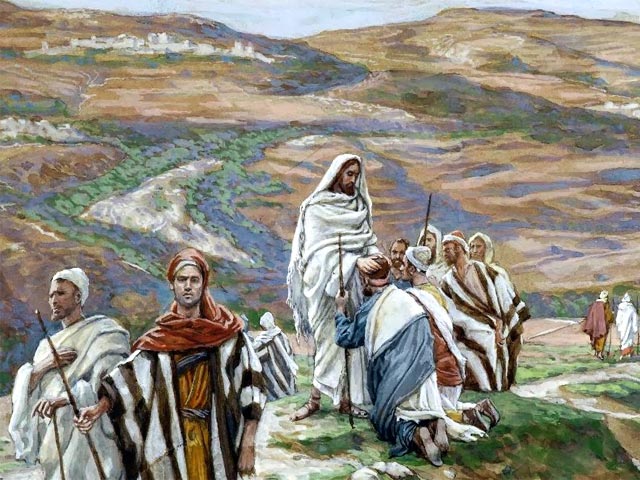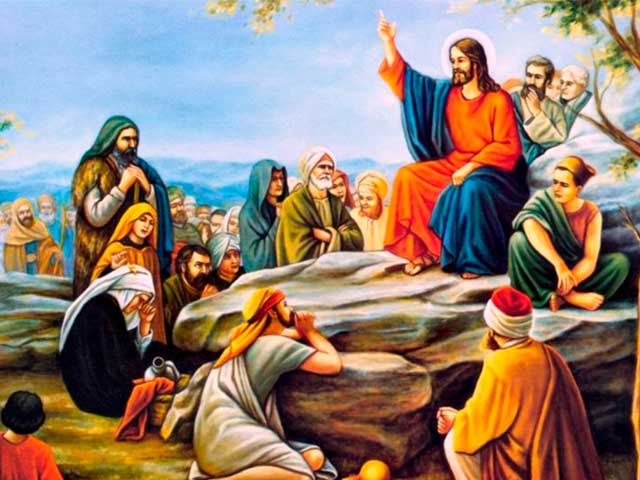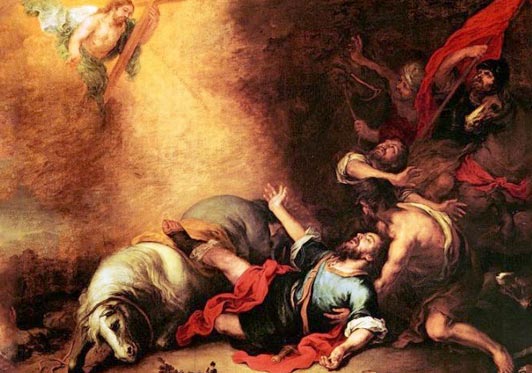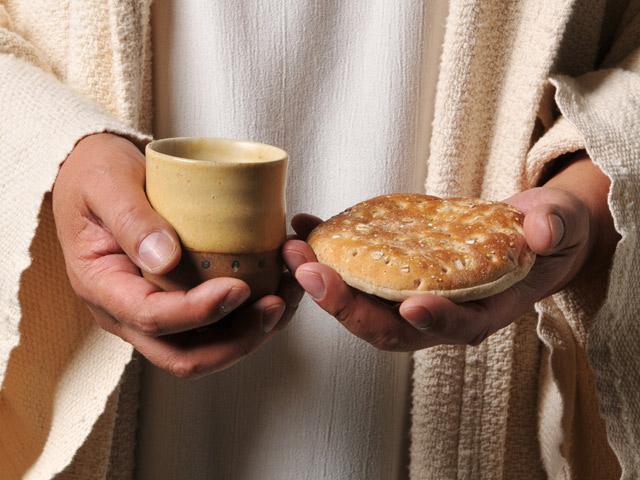March 19, 2018
Solemnity of Saint Joseph, spouse of the Blessed Virgin Mary
Lectionary: 543
Reading 1 2 Sm 7:4-5a, 12-14a, 16
The LORD spoke to Nathan and said:
“Go, tell my servant David,
‘When your time comes and you rest with your ancestors,
I will raise up your heir after you, sprung from your loins,
and I will make his kingdom firm.
It is he who shall build a house for my name.
And I will make his royal throne firm forever.
I will be a father to him,
and he shall be a son to me.
Your house and your kingdom shall endure forever before me;
your throne shall stand firm forever.'”
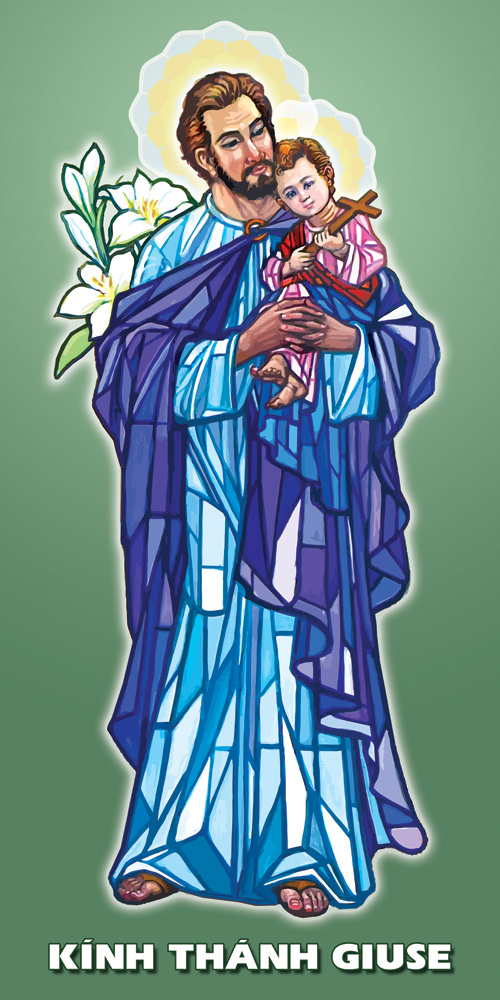 Responsorial Psalm Ps 89:2-3, 4-5, 27 and 29
Responsorial Psalm Ps 89:2-3, 4-5, 27 and 29
- (37) The son of David will live for ever.
The promises of the LORD I will sing forever;
through all generations my mouth shall proclaim your faithfulness,
For you have said, “My kindness is established forever”;
in heaven you have confirmed your faithfulness.
R. The son of David will live for ever.
“I have made a covenant with my chosen one,
I have sworn to David my servant:
Forever will I confirm your posterity
and establish your throne for all generations.”
R. The son of David will live for ever.
“He shall say of me, ‘You are my father,
my God, the Rock, my savior.’
Forever I will maintain my kindness toward him,
and my covenant with him stands firm.”
R. The son of David will live for ever.
Reading 2 Rom 4:13, 16-18, 22
Brothers and sisters:
It was not through the law
that the promise was made to Abraham and his descendants
that he would inherit the world,
but through the righteousness that comes from faith.
For this reason, it depends on faith,
so that it may be a gift,
and the promise may be guaranteed to all his descendants,
not to those who only adhere to the law
but to those who follow the faith of Abraham,
who is the father of all of us, as it is written,
I have made you father of many nations.
He is our father in the sight of God,
in whom he believed, who gives life to the dead
and calls into being what does not exist.
He believed, hoping against hope,
that he would become the father of many nations,
according to what was said, Thus shall your descendants be.
That is why it was credited to him as righteousness.
Verse Before THE gOSPEL Ps 84:5
Blessed are those who dwell in your house, O Lord;
they never cease to praise you.
Gospel Mt 1:16, 18-21, 24a
Jacob was the father of Joseph, the husband of Mary.
Of her was born Jesus who is called the Christ.
Now this is how the birth of Jesus Christ came about.
When his mother Mary was betrothed to Joseph,
but before they lived together,
she was found with child through the Holy Spirit.
Joseph her husband, since he was a righteous man,
yet unwilling to expose her to shame,
decided to divorce her quietly.
Such was his intention when, behold,
the angel of the Lord appeared to him in a dream and said,
“Joseph, son of David,
do not be afraid to take Mary your wife into your home.
For it is through the Holy Spirit
that this child has been conceived in her.
She will bear a son and you are to name him Jesus,
because he will save his people from their sins.”
When Joseph awoke,
he did as the angel of the Lord had commanded him
and took his wife into his home.
or Lk 2:41-51a
Each year Jesus’ parents went to Jerusalem for the feast of Passover,
and when he was twelve years old,
they went up according to festival custom.
After they had completed its days, as they were returning,
the boy Jesus remained behind in Jerusalem,
but his parents did not know it.
Thinking that he was in the caravan,
they journeyed for a day
and looked for him among their relatives and acquaintances,
but not finding him,
they returned to Jerusalem to look for him.
After three days they found him in the temple,
sitting in the midst of the teachers,
listening to them and asking them questions,
and all who heard him were astounded
at his understanding and his answers.
When his parents saw him,
they were astonished,
and his mother said to him,
“Son, why have you done this to us?
Your father and I have been looking for you with great anxiety.”
And he said to them,
“Why were you looking for me?
Did you not know that I must be in my Father’s house?”
But they did not understand what he said to them.
He went down with them and came to Nazareth,
and was obedient to them.
March 20, 2018
Tuesday of the Fifth Week of Lent
Lectionary: 252
Reading 1 Nm 21:4-9
From Mount Hor the children of Israel set out on the Red Sea road,
to bypass the land of Edom.
But with their patience worn out by the journey,
the people complained against God and Moses,
“Why have you brought us up from Egypt to die in this desert,
where there is no food or water?
We are disgusted with this wretched food!”
In punishment the LORD sent among the people saraph serpents,
which bit the people so that many of them died.
Then the people came to Moses and said,
“We have sinned in complaining against the LORD and you.
Pray the LORD to take the serpents away from us.”
So Moses prayed for the people, and the LORD said to Moses,
“Make a saraph and mount it on a pole,
and whoever looks at it after being bitten will live.”
Moses accordingly made a bronze serpent and mounted it on a pole,
and whenever anyone who had been bitten by a serpent
looked at the bronze serpent, he lived.
Responsorial Psalm Ps 102:2-3, 16-18, 19-21
- (2) O Lord, hear my prayer, and let my cry come to you.
O LORD, hear my prayer,
and let my cry come to you.
Hide not your face from me
in the day of my distress.
Incline your ear to me;
in the day when I call, answer me speedily.
R. O Lord, hear my prayer, and let my cry come to you.
The nations shall revere your name, O LORD,
and all the kings of the earth your glory,
When the LORD has rebuilt Zion
and appeared in his glory;
When he has regarded the prayer of the destitute,
and not despised their prayer.
R. O Lord, hear my prayer, and let my cry come to you.
Let this be written for the generation to come,
and let his future creatures praise the LORD:
“The LORD looked down from his holy height,
from heaven he beheld the earth,
To hear the groaning of the prisoners,
to release those doomed to die.”
R. O Lord, hear my prayer, and let my cry come to you.
Verse Before the Gospel
The seed is the word of God, Christ is the sower;
all who come to him will live for ever.
Gospel Jn 8:21-30
Jesus said to the Pharisees:
“I am going away and you will look for me,
but you will die in your sin.
Where I am going you cannot come.”
So the Jews said,
“He is not going to kill himself, is he,
because he said, ‘Where I am going you cannot come’?”
He said to them, “You belong to what is below,
I belong to what is above.
You belong to this world,
but I do not belong to this world.
That is why I told you that you will die in your sins.
For if you do not believe that I AM,
you will die in your sins.”
So they said to him, “Who are you?”
Jesus said to them, “What I told you from the beginning.
I have much to say about you in condemnation.
But the one who sent me is true,
and what I heard from him I tell the world.”
They did not realize that he was speaking to them of the Father.
So Jesus said to them,
“When you lift up the Son of Man,
then you will realize that I AM,
and that I do nothing on my own,
but I say only what the Father taught me.
The one who sent me is with me.
He has not left me alone,
because I always do what is pleasing to him.”
Because he spoke this way, many came to believe in him.
March 21, 2018
Wednesday of the Fifth Week of Lent
Lectionary: 253
Reading 1 Dn 3:14-20, 91-92, 95
King Nebuchadnezzar said:
“Is it true, Shadrach, Meshach, and Abednego,
that you will not serve my god,
or worship the golden statue that I set up?
Be ready now to fall down and worship the statue I had made,
whenever you hear the sound of the trumpet,
flute, lyre, harp, psaltery, bagpipe,
and all the other musical instruments;
otherwise, you shall be instantly cast into the white-hot furnace;
and who is the God who can deliver you out of my hands?”
Shadrach, Meshach, and Abednego answered King Nebuchadnezzar,
“There is no need for us to defend ourselves before you
in this matter.
If our God, whom we serve,
can save us from the white-hot furnace
and from your hands, O king, may he save us!
But even if he will not, know, O king,
that we will not serve your god
or worship the golden statue that you set up.”
King Nebuchadnezzar’s face became livid with utter rage
against Shadrach, Meshach, and Abednego.
He ordered the furnace to be heated seven times more than usual
and had some of the strongest men in his army
bind Shadrach, Meshach, and Abednego
and cast them into the white-hot furnace.
Nebuchadnezzar rose in haste and asked his nobles,
“Did we not cast three men bound into the fire?”
“Assuredly, O king,” they answered.
“But,” he replied, “I see four men unfettered and unhurt,
walking in the fire, and the fourth looks like a son of God.”
Nebuchadnezzar exclaimed,
“Blessed be the God of Shadrach, Meshach, and Abednego,
who sent his angel to deliver the servants who trusted in him;
they disobeyed the royal command and yielded their bodies
rather than serve or worship any god
except their own God.”
Responsorial Psalm Dn 3:52, 53, 54, 55, 56
- (52b) Glory and praise for ever!
“Blessed are you, O Lord, the God of our fathers,
praiseworthy and exalted above all forever;
And blessed is your holy and glorious name,
praiseworthy and exalted above all for all ages.”
R. Glory and praise for ever!
“Blessed are you in the temple of your holy glory,
praiseworthy and exalted above all forever.
R. Glory and praise for ever!
“Blessed are you on the throne of your kingdom,
praiseworthy and exalted above all forever.”
R. Glory and praise for ever!
“Blessed are you who look into the depths
from your throne upon the cherubim;
praiseworthy and exalted above all forever.”
R. Glory and praise for ever!
“Blessed are you in the firmament of heaven,
praiseworthy and glorious forever.”
R. Glory and praise for ever!
Verse Before the Gospel See Lk 8:15
Blessed are they who have kept the word with a generous heart
and yield a harvest through perseverance.
Gospel Jn 8:31-42
Jesus said to those Jews who believed in him,
“If you remain in my word, you will truly be my disciples,
and you will know the truth, and the truth will set you free.”
They answered him, “We are descendants of Abraham
and have never been enslaved to anyone.
How can you say, ‘You will become free’?”
Jesus answered them, “Amen, amen, I say to you,
everyone who commits sin is a slave of sin.
A slave does not remain in a household forever,
but a son always remains.
So if the Son frees you, then you will truly be free.
I know that you are descendants of Abraham.
But you are trying to kill me,
because my word has no room among you.
I tell you what I have seen in the Father’s presence;
then do what you have heard from the Father.”
They answered and said to him, “Our father is Abraham.”
Jesus said to them, “If you were Abraham’s children,
you would be doing the works of Abraham.
But now you are trying to kill me,
a man who has told you the truth that I heard from God;
Abraham did not do this.
You are doing the works of your father!”
So they said to him, “We were not born of fornication.
We have one Father, God.”
Jesus said to them, “If God were your Father, you would love me,
for I came from God and am here;
I did not come on my own, but he sent me.”
March 22, 2018
Thursday of the Fifth Week of Lent
Lectionary: 254
Reading 1 Gn 17:3-9
When Abram prostrated himself, God spoke to him:
“My covenant with you is this:
you are to become the father of a host of nations.
No longer shall you be called Abram;
your name shall be Abraham,
for I am making you the father of a host of nations.
I will render you exceedingly fertile;
I will make nations of you;
kings shall stem from you.
I will maintain my covenant with you
and your descendants after you
throughout the ages as an everlasting pact,
to be your God and the God of your descendants after you.
I will give to you
and to your descendants after you
the land in which you are now staying,
the whole land of Canaan, as a permanent possession;
and I will be their God.”
God also said to Abraham:
“On your part, you and your descendants after you
must keep my covenant throughout the ages.”
Responsorial Psalm Ps 105:4-5, 6-7, 8-9
- (8a) The Lord remembers his covenant for ever.
Look to the LORD in his strength;
seek to serve him constantly.
Recall the wondrous deeds that he has wrought,
his portents, and the judgments he has uttered.
R. The Lord remembers his covenant for ever.
You descendants of Abraham, his servants,
sons of Jacob, his chosen ones!
He, the LORD, is our God;
throughout the earth his judgments prevail.
R. The Lord remembers his covenant for ever.
He remembers forever his covenant
which he made binding for a thousand generations –
Which he entered into with Abraham
and by his oath to Isaac.
R. The Lord remembers his covenant for ever.
Verse Before the Gospel Ps 95:8
If today you hear his voice,
harden not your hearts.
Gospel Jn 8:51-59
Jesus said to the Jews:
“Amen, amen, I say to you,
whoever keeps my word will never see death.”
So the Jews said to him,
“Now we are sure that you are possessed.
Abraham died, as did the prophets, yet you say,
‘Whoever keeps my word will never taste death.’
Are you greater than our father Abraham, who died?
Or the prophets, who died?
Who do you make yourself out to be?”
Jesus answered, “If I glorify myself, my glory is worth nothing;
but it is my Father who glorifies me,
of whom you say, ‘He is our God.’
You do not know him, but I know him.
And if I should say that I do not know him,
I would be like you a liar.
But I do know him and I keep his word.
Abraham your father rejoiced to see my day;
he saw it and was glad.”
So the Jews said to him,
“You are not yet fifty years old and you have seen Abraham?”
Jesus said to them, “Amen, amen, I say to you,
before Abraham came to be, I AM.”
So they picked up stones to throw at him;
but Jesus hid and went out of the temple area.
March 23, 2018
Friday of the Fifth Week of Lent
Lectionary: 255
Reading 1 Jer 20:10-13
I hear the whisperings of many:
“Terror on every side!
Denounce! let us denounce him!”
All those who were my friends
are on the watch for any misstep of mine.
“Perhaps he will be trapped; then we can prevail,
and take our vengeance on him.”
But the LORD is with me, like a mighty champion:
my persecutors will stumble, they will not triumph.
In their failure they will be put to utter shame,
to lasting, unforgettable confusion.
O LORD of hosts, you who test the just,
who probe mind and heart,
Let me witness the vengeance you take on them,
for to you I have entrusted my cause.
Sing to the LORD,
praise the LORD,
For he has rescued the life of the poor
from the power of the wicked!
Responsorial Psalm Ps 18:2-3a, 3bc-4, 5-6, 7
- (see 7) In my distress I called upon the Lord, and he heard my voice.
I love you, O LORD, my strength,
O LORD, my rock, my fortress, my deliverer.
R. In my distress I called upon the Lord, and he heard my voice.
My God, my rock of refuge,
my shield, the horn of my salvation, my stronghold!
Praised be the LORD, I exclaim,
and I am safe from my enemies.
R. In my distress I called upon the Lord, and he heard my voice.
The breakers of death surged round about me,
the destroying floods overwhelmed me;
The cords of the nether world enmeshed me,
the snares of death overtook me.
R. In my distress I called upon the Lord, and he heard my voice.
In my distress I called upon the LORD
and cried out to my God;
From his temple he heard my voice,
and my cry to him reached his ears.
R. In my distress I called upon the Lord, and he heard my voice.
Verse Before the Gospel See Jn 6:63c, 68c
Your words, Lord, are Spirit and life;
you have the words of everlasting life.
Gospel Jn 10:31-42
The Jews picked up rocks to stone Jesus.
Jesus answered them, “I have shown you many good works from my Father.
For which of these are you trying to stone me?”
The Jews answered him,
“We are not stoning you for a good work but for blasphemy.
You, a man, are making yourself God.”
Jesus answered them,
“Is it not written in your law, ‘I said, ‘You are gods”‘?
If it calls them gods to whom the word of God came,
and Scripture cannot be set aside,
can you say that the one
whom the Father has consecrated and sent into the world
blasphemes because I said, ‘I am the Son of God’?
If I do not perform my Father’s works, do not believe me;
but if I perform them, even if you do not believe me,
believe the works, so that you may realize and understand
that the Father is in me and I am in the Father.”
Then they tried again to arrest him;
but he escaped from their power.
He went back across the Jordan
to the place where John first baptized, and there he remained.
Many came to him and said,
“John performed no sign,
but everything John said about this man was true.”
And many there began to believe in him.
March 24, 2018
Saturday of the Fifth Week of Lent
Lectionary: 256
Reading 1 Ez 37:21-28
Thus says the Lord GOD:
I will take the children of Israel from among the nations
to which they have come,
and gather them from all sides to bring them back to their land.
I will make them one nation upon the land,
in the mountains of Israel,
and there shall be one prince for them all.
Never again shall they be two nations,
and never again shall they be divided into two kingdoms.
No longer shall they defile themselves with their idols,
their abominations, and all their transgressions.
I will deliver them from all their sins of apostasy,
and cleanse them so that they may be my people
and I may be their God.
My servant David shall be prince over them,
and there shall be one shepherd for them all;
they shall live by my statutes and carefully observe my decrees.
They shall live on the land that I gave to my servant Jacob,
the land where their fathers lived;
they shall live on it forever,
they, and their children, and their children’s children,
with my servant David their prince forever.
I will make with them a covenant of peace;
it shall be an everlasting covenant with them,
and I will multiply them, and put my sanctuary among them forever.
My dwelling shall be with them;
I will be their God, and they shall be my people.
Thus the nations shall know that it is I, the LORD,
who make Israel holy,
when my sanctuary shall be set up among them forever.
Responsorial Psalm Jer 31:10, 11-12abcd, 13
- (see 10d) The Lord will guard us, as a shepherd guards his flock.
Hear the word of the LORD, O nations,
proclaim it on distant isles, and say:
He who scattered Israel, now gathers them together,
he guards them as a shepherd his flock.
R. The Lord will guard us, as a shepherd guards his flock.
The LORD shall ransom Jacob,
he shall redeem him from the hand of his conqueror.
Shouting, they shall mount the heights of Zion,
they shall come streaming to the LORD’s blessings:
The grain, the wine, and the oil,
the sheep and the oxen.
R. The Lord will guard us, as a shepherd guards his flock.
Then the virgins shall make merry and dance,
and young men and old as well.
I will turn their mourning into joy,
I will console and gladden them after their sorrows.
R. The Lord will guard us, as a shepherd guards his flock.
Verse Before the Gospel Ez 18:31
Cast away from you all the crimes you have committed, says the LORD,
and make for yourselves a new heart and a new spirit.
Gospel Jn 11:45-56
Many of the Jews who had come to Mary
and seen what Jesus had done began to believe in him.
But some of them went to the Pharisees
and told them what Jesus had done.
So the chief priests and the Pharisees
convened the Sanhedrin and said,
“What are we going to do?
This man is performing many signs.
If we leave him alone, all will believe in him,
and the Romans will come
and take away both our land and our nation.”
But one of them, Caiaphas,
who was high priest that year, said to them,
“You know nothing,
nor do you consider that it is better for you
that one man should die instead of the people,
so that the whole nation may not perish.”
He did not say this on his own,
but since he was high priest for that year,
he prophesied that Jesus was going to die for the nation,
and not only for the nation,
but also to gather into one the dispersed children of God.
So from that day on they planned to kill him.
So Jesus no longer walked about in public among the Jews,
but he left for the region near the desert,
to a town called Ephraim,
and there he remained with his disciples.
Now the Passover of the Jews was near,
and many went up from the country to Jerusalem
before Passover to purify themselves.
They looked for Jesus and said to one another
as they were in the temple area, “What do you think?
That he will not come to the feast?”
March 25, 2018
Palm Sunday of the Lord’s Passion
Lectionary: 37 and 38
 At the Procession with Palms – Gospel Mk 11:1-10
At the Procession with Palms – Gospel Mk 11:1-10
When Jesus and his disciples drew near to Jerusalem,
to Bethphage and Bethany at the Mount of Olives,
he sent two of his disciples and said to them,
“Go into the village opposite you,
and immediately on entering it,
you will find a colt tethered on which no one has ever sat.
Untie it and bring it here.
If anyone should say to you,
‘Why are you doing this?’ reply,
‘The Master has need of it
and will send it back here at once.'”
So they went off
and found a colt tethered at a gate outside on the street,
and they untied it.
Some of the bystanders said to them,
“What are you doing, untying the colt?”
They answered them just as Jesus had told them to,
and they permitted them to do it.
So they brought the colt to Jesus
and put their cloaks over it.
And he sat on it.
Many people spread their cloaks on the road,
and others spread leafy branches
that they had cut from the fields.
Those preceding him as well as those following kept crying out:
“Hosanna!
Blessed is he who comes in the name of the Lord!
Blessed is the kingdom of our father David that is to come!
Hosanna in the highest!”
or Jn 12:12-16
When the great crowd that had come to the feast heard
that Jesus was coming to Jerusalem,
they took palm branches and went out to meet him, and cried out:
“Hosanna!
“Blessed is he who comes in the name of the Lord,
the king of Israel.”
Jesus found an ass and sat upon it, as is written:
Fear no more, O daughter Zion;
see, your king comes, seated upon an ass’s colt.
His disciples did not understand this at first,
but when Jesus had been glorified
they remembered that these things were written about him
and that they had done this for him.
At the Mass – Reading 1 Is 50:4-7
The Lord GOD has given me
a well-trained tongue,
that I might know how to speak to the weary
a word that will rouse them.
Morning after morning
he opens my ear that I may hear;
and I have not rebelled,
have not turned back.
I gave my back to those who beat me,
my cheeks to those who plucked my beard;
my face I did not shield
from buffets and spitting.
The Lord GOD is my help,
therefore I am not disgraced;
I have set my face like flint,
knowing that I shall not be put to shame.
Responsorial Psalm Ps 22:8-9, 17-18, 19-20, 23-24.
- (2a) My God, my God, why have you abandoned me?
All who see me scoff at me;
they mock me with parted lips, they wag their heads:
“He relied on the LORD; let him deliver him,
let him rescue him, if he loves him.”
R. My God, my God, why have you abandoned me?
Indeed, many dogs surround me,
a pack of evildoers closes in upon me;
They have pierced my hands and my feet;
I can count all my bones.
R. My God, my God, why have you abandoned me?
They divide my garments among them,
and for my vesture they cast lots.
But you, O LORD, be not far from me;
O my help, hasten to aid me.
R. My God, my God, why have you abandoned me?
I will proclaim your name to my brethren;
in the midst of the assembly I will praise you:
“You who fear the LORD, praise him;
all you descendants of Jacob, give glory to him;
revere him, all you descendants of Israel!”
R. My God, my God, why have you abandoned me?
Reading 2 Phil 2:6-11
Christ Jesus, though he was in the form of God,
did not regard equality with God
something to be grasped.
Rather, he emptied himself,
taking the form of a slave,
coming in human likeness;
and found human in appearance,
he humbled himself,
becoming obedient to the point of death,
even death on a cross.
Because of this, God greatly exalted him
and bestowed on him the name
which is above every name,
that at the name of Jesus
every knee should bend,
of those in heaven and on earth and under the earth,
and every tongue confess that
Jesus Christ is Lord,
to the glory of God the Father.
Verse Before the Gospel Phil 2:8-9
Christ became obedient to the point of death,
even death on a cross.
Because of this, God greatly exalted him
and bestowed on him the name which is above every name.
Gospel Mk 14:1—15:47
The Passover and the Feast of Unleavened Bread
were to take place in two days’ time.
So the chief priests and the scribes were seeking a way
to arrest him by treachery and put him to death.
They said, “Not during the festival,
for fear that there may be a riot among the people.”
When he was in Bethany reclining at table
in the house of Simon the leper,
a woman came with an alabaster jar of perfumed oil,
costly genuine spikenard.
She broke the alabaster jar and poured it on his head.
There were some who were indignant.
“Why has there been this waste of perfumed oil?
It could have been sold for more than three hundred days’ wages
and the money given to the poor.”
They were infuriated with her.
Jesus said, “Let her alone.
Why do you make trouble for her?
She has done a good thing for me.
The poor you will always have with you,
and whenever you wish you can do good to them,
but you will not always have me.
She has done what she could.
She has anticipated anointing my body for burial.
Amen, I say to you,
wherever the gospel is proclaimed to the whole world,
what she has done will be told in memory of her.”
Then Judas Iscariot, one of the Twelve,
went off to the chief priests to hand him over to them.
When they heard him they were pleased and promised to pay him money.
Then he looked for an opportunity to hand him over.
On the first day of the Feast of Unleavened Bread,
when they sacrificed the Passover lamb,
his disciples said to him,
“Where do you want us to go
and prepare for you to eat the Passover?”
He sent two of his disciples and said to them,
“Go into the city and a man will meet you,
carrying a jar of water.
Follow him.
Wherever he enters, say to the master of the house,
‘The Teacher says, “Where is my guest room
where I may eat the Passover with my disciples?”‘
Then he will show you a large upper room furnished and ready.
Make the preparations for us there.”
The disciples then went off, entered the city,
and found it just as he had told them;
and they prepared the Passover.
When it was evening, he came with the Twelve.
And as they reclined at table and were eating, Jesus said,
“Amen, I say to you, one of you will betray me,
one who is eating with me.”
They began to be distressed and to say to him, one by one,
“Surely it is not I?”
He said to them,
“One of the Twelve, the one who dips with me into the dish.
For the Son of Man indeed goes, as it is written of him,
but woe to that man by whom the Son of Man is betrayed.
It would be better for that man if he had never been born.”
While they were eating,
he took bread, said the blessing,
broke it, and gave it to them, and said,
“Take it; this is my body.”
Then he took a cup, gave thanks, and gave it to them,
and they all drank from it.
He said to them,
“This is my blood of the covenant,
which will be shed for many.
Amen, I say to you,
I shall not drink again the fruit of the vine
until the day when I drink it new in the kingdom of God.”
Then, after singing a hymn,
they went out to the Mount of Olives.
Then Jesus said to them,
“All of you will have your faith shaken, for it is written:
I will strike the shepherd,
and the sheep will be dispersed.
But after I have been raised up,
I shall go before you to Galilee.”
Peter said to him,
“Even though all should have their faith shaken,
mine will not be.”
Then Jesus said to him,
“Amen, I say to you,
this very night before the cock crows twice
you will deny me three times.”
But he vehemently replied,
“Even though I should have to die with you,
I will not deny you.”
And they all spoke similarly.
Then they came to a place named Gethsemane,
and he said to his disciples,
“Sit here while I pray.”
He took with him Peter, James, and John,
and began to be troubled and distressed.
Then he said to them, “My soul is sorrowful even to death.
Remain here and keep watch.”
He advanced a little and fell to the ground and prayed
that if it were possible the hour might pass by him;
he said, “Abba, Father, all things are possible to you.
Take this cup away from me,
but not what I will but what you will.”
When he returned he found them asleep.
He said to Peter, “Simon, are you asleep?
Could you not keep watch for one hour?
Watch and pray that you may not undergo the test.
The spirit is willing but the flesh is weak.”
Withdrawing again, he prayed, saying the same thing.
Then he returned once more and found them asleep,
for they could not keep their eyes open
and did not know what to answer him.
He returned a third time and said to them,
“Are you still sleeping and taking your rest?
It is enough. The hour has come.
Behold, the Son of Man is to be handed over to sinners.
Get up, let us go.
See, my betrayer is at hand.”
Then, while he was still speaking,
Judas, one of the Twelve, arrived,
accompanied by a crowd with swords and clubs
who had come from the chief priests,
the scribes, and the elders.
His betrayer had arranged a signal with them, saying,
“The man I shall kiss is the one;
arrest him and lead him away securely.”
He came and immediately went over to him and said,
“Rabbi.” And he kissed him.
At this they laid hands on him and arrested him.
One of the bystanders drew his sword,
struck the high priest’s servant, and cut off his ear.
Jesus said to them in reply,
“Have you come out as against a robber,
with swords and clubs, to seize me?
Day after day I was with you teaching in the temple area,
yet you did not arrest me;
but that the Scriptures may be fulfilled.”
And they all left him and fled.
Now a young man followed him
wearing nothing but a linen cloth about his body.
They seized him,
but he left the cloth behind and ran off naked.
They led Jesus away to the high priest,
and all the chief priests and the elders and the scribes came together.
Peter followed him at a distance into the high priest’s courtyard
and was seated with the guards, warming himself at the fire.
The chief priests and the entire Sanhedrin
kept trying to obtain testimony against Jesus
in order to put him to death, but they found none.
Many gave false witness against him,
but their testimony did not agree.
Some took the stand and testified falsely against him,
alleging, “We heard him say,
‘I will destroy this temple made with hands
and within three days I will build another
not made with hands.'”
Even so their testimony did not agree.
The high priest rose before the assembly and questioned Jesus,
saying, “Have you no answer?
What are these men testifying against you?”
But he was silent and answered nothing.
Again the high priest asked him and said to him,
“Are you the Christ, the son of the Blessed One?”
Then Jesus answered, “I am;
and ‘you will see the Son of Man
seated at the right hand of the Power
and coming with the clouds of heaven.'”
At that the high priest tore his garments and said,
“What further need have we of witnesses?
You have heard the blasphemy.
What do you think?”
They all condemned him as deserving to die.
Some began to spit on him.
They blindfolded him and struck him and said to him, “Prophesy!”
And the guards greeted him with blows.
While Peter was below in the courtyard,
one of the high priest’s maids came along.
Seeing Peter warming himself,
she looked intently at him and said,
“You too were with the Nazarene, Jesus.”
But he denied it saying,
“I neither know nor understand what you are talking about.”
So he went out into the outer court.
Then the cock crowed.
The maid saw him and began again to say to the bystanders,
“This man is one of them.”
Once again he denied it.
A little later the bystanders said to Peter once more,
“Surely you are one of them; for you too are a Galilean.”
He began to curse and to swear,
“I do not know this man about whom you are talking.”
And immediately a cock crowed a second time.
Then Peter remembered the word that Jesus had said to him,
“Before the cock crows twice you will deny me three times.”
He broke down and wept.
As soon as morning came,
the chief priests with the elders and the scribes,
that is, the whole Sanhedrin held a council.
They bound Jesus, led him away, and handed him over to Pilate.
Pilate questioned him,
“Are you the king of the Jews?”
He said to him in reply, “You say so.”
The chief priests accused him of many things.
Again Pilate questioned him,
“Have you no answer?
See how many things they accuse you of.”
Jesus gave him no further answer, so that Pilate was amazed.
Now on the occasion of the feast he used to release to them
one prisoner whom they requested.
A man called Barabbas was then in prison
along with the rebels who had committed murder in a rebellion.
The crowd came forward and began to ask him
to do for them as he was accustomed.
Pilate answered,
“Do you want me to release to you the king of the Jews?”
For he knew that it was out of envy
that the chief priests had handed him over.
But the chief priests stirred up the crowd
to have him release Barabbas for them instead.
Pilate again said to them in reply,
“Then what do you want me to do
with the man you call the king of the Jews?”
They shouted again, “Crucify him.”
Pilate said to them, “Why? What evil has he done?”
They only shouted the louder, “Crucify him.”
So Pilate, wishing to satisfy the crowd,
released Barabbas to them and, after he had Jesus scourged,
handed him over to be crucified.
The soldiers led him away inside the palace,
that is, the praetorium, and assembled the whole cohort.
They clothed him in purple and,
weaving a crown of thorns, placed it on him.
They began to salute him with, “Hail, King of the Jews!”
and kept striking his head with a reed and spitting upon him.
They knelt before him in homage.
And when they had mocked him,
they stripped him of the purple cloak,
dressed him in his own clothes,
and led him out to crucify him.
They pressed into service a passer-by, Simon,
a Cyrenian, who was coming in from the country,
the father of Alexander and Rufus,
to carry his cross.
They brought him to the place of Golgotha
— which is translated Place of the Skull —
They gave him wine drugged with myrrh,
but he did not take it.
Then they crucified him and divided his garments
by casting lots for them to see what each should take.
It was nine o’clock in the morning when they crucified him.
The inscription of the charge against him read,
“The King of the Jews.”
With him they crucified two revolutionaries,
one on his right and one on his left.
Those passing by reviled him,
shaking their heads and saying,
“Aha! You who would destroy the temple
and rebuild it in three days,
save yourself by coming down from the cross.”
Likewise the chief priests, with the scribes,
mocked him among themselves and said,
“He saved others; he cannot save himself.
Let the Christ, the King of Israel,
come down now from the cross
that we may see and believe.”
Those who were crucified with him also kept abusing him.
At noon darkness came over the whole land
until three in the afternoon.
And at three o’clock Jesus cried out in a loud voice,
“Eloi, Eloi, lema sabachthani?”
which is translated,
“My God, my God, why have you forsaken me?”
Some of the bystanders who heard it said,
“Look, he is calling Elijah.”
One of them ran, soaked a sponge with wine, put it on a reed
and gave it to him to drink saying,
“Wait, let us see if Elijah comes to take him down.”
Jesus gave a loud cry and breathed his last.
Here all kneel and pause for a short time.
The veil of the sanctuary was torn in two from top to bottom.
When the centurion who stood facing him
saw how he breathed his last he said,
“Truly this man was the Son of God!”
There were also women looking on from a distance.
Among them were Mary Magdalene,
Mary the mother of the younger James and of Joses, and Salome.
These women had followed him when he was in Galilee
and ministered to him.
There were also many other women
who had come up with him to Jerusalem.
When it was already evening,
since it was the day of preparation,
the day before the sabbath, Joseph of Arimathea,
a distinguished member of the council,
who was himself awaiting the kingdom of God,
came and courageously went to Pilate
and asked for the body of Jesus.
Pilate was amazed that he was already dead.
He summoned the centurion
and asked him if Jesus had already died.
And when he learned of it from the centurion,
he gave the body to Joseph.
Having bought a linen cloth, he took him down,
wrapped him in the linen cloth,
and laid him in a tomb that had been hewn out of the rock.
Then he rolled a stone against the entrance to the tomb.
Mary Magdalene and Mary the mother of Joses
watched where he was laid.
or Mk 15:1-39
As soon as morning came,
the chief priests with the elders and the scribes,
that is, the whole Sanhedrin held a council.
They bound Jesus, led him away, and handed him over to Pilate.
Pilate questioned him,
“Are you the king of the Jews?”
He said to him in reply, “You say so.”
The chief priests accused him of many things.
Again Pilate questioned him,
“Have you no answer?
See how many things they accuse you of.”
Jesus gave him no further answer, so that Pilate was amazed.
Now on the occasion of the feast he used to release to them
one prisoner whom they requested.
A man called Barabbas was then in prison
along with the rebels who had committed murder in a rebellion.
The crowd came forward and began to ask him
to do for them as he was accustomed.
Pilate answered,
“Do you want me to release to you the king of the Jews?”
For he knew that it was out of envy
that the chief priests had handed him over.
But the chief priests stirred up the crowd
to have him release Barabbas for them instead.
Pilate again said to them in reply,
“Then what do you want me to do
with the man you call the king of the Jews?”
They shouted again, “Crucify him.”
Pilate said to them, “Why? What evil has he done?”
They only shouted the louder, “Crucify him.”
So Pilate, wishing to satisfy the crowd,
released Barabbas to them and, after he had Jesus scourged,
handed him over to be crucified.
The soldiers led him away inside the palace,
that is, the praetorium, and assembled the whole cohort.
They clothed him in purple and,
weaving a crown of thorns, placed it on him.
They began to salute him with, “Hail, King of the Jews!”
and kept striking his head with a reed and spitting upon him.
They knelt before him in homage.
And when they had mocked him,
they stripped him of the purple cloak,
dressed him in his own clothes,
and led him out to crucify him.
They pressed into service a passer-by, Simon,
a Cyrenian, who was coming in from the country,
the father of Alexander and Rufus,
to carry his cross.
They brought him to the place of Golgotha
—which is translated Place of the Skull —
They gave him wine drugged with myrrh,
but he did not take it.
Then they crucified him and divided his garments
by casting lots for them to see what each should take.
It was nine o’clock in the morning when they crucified him.
The inscription of the charge against him read,
“The King of the Jews.”
With him they crucified two revolutionaries,
one on his right and one on his left.
Those passing by reviled him,
shaking their heads and saying,
“Aha! You who would destroy the temple
and rebuild it in three days,
save yourself by coming down from the cross.”
Likewise the chief priests, with the scribes,
mocked him among themselves and said,
“He saved others; he cannot save himself.
Let the Christ, the King of Israel,
come down now from the cross
that we may see and believe.”
Those who were crucified with him also kept abusing him.
At noon darkness came over the whole land
until three in the afternoon.
And at three o’clock Jesus cried out in a loud voice,
“Eloi, Eloi, lema sabachthani?”
which is translated,
“My God, my God, why have you forsaken me?”
Some of the bystanders who heard it said,
“Look, he is calling Elijah.”
One of them ran, soaked a sponge with wine, put it on a reed
and gave it to him to drink saying,
“Wait, let us see if Elijah comes to take him down.”
Jesus gave a loud cry and breathed his last.
Here all kneel and pause for a short time.
The veil of the sanctuary was torn in two from top to bottom.
When the centurion who stood facing him
saw how he breathed his last he said,
“Truly this man was the Son of God!”

